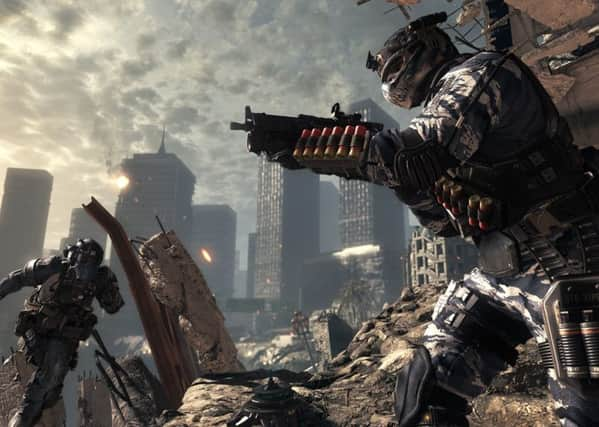Martyn McLaughlin: Game on for virtual ‘sport’


The august list of Scottish sporting greats is dominated by those who have demonstrated their prowess on a football pitch, but even the most dedicated fans of minority pursuits would scratch their head and draw a blank when asked to consider whether Mark Bryceland is worthy of inclusion.
A Glasgow teenager, Bryceland commands a global following thanks to his mastery of Call of Duty, one of the world’s most popular video game series. He makes a decent living, winning up to £12,000 in some tournaments, and thanks to a roster of sponsors, routinely flies around the world to pit his skills against other players.
Advertisement
Hide AdAdvertisement
Hide AdHe is not the first Scot to excel in his field. A decade ago, a broadsheet editor indulged my interest in the then little-known pursuit of e-sports by commissioning a magazine feature on the topic, featuring an interview with Paul McGarrity, a slightly built 19-year-old who played for an organisation known as Team Dignitas. “My mum and dad thought I was wasting my time,” he told me. “They thought it was just a fad.”
They would not have been alone. The persistent stigmas surrounding video games which see a £91 billion industry misconstrued as pernicious influence upon the young means that the competitive arena known as e-sports remains as obscure as it was back in 2005 when I met McGarrity in Edinburgh.
Yet the scene is one of the fastest growing and intriguing strands of the entertainment world, one that is increasingly catching the eye of major corporations who have come to appreciate the potential for profit. Last week, Team Dignitas was sold to a competing firm, Follow Esports, for around £625,000, a payment which is effectively a transfer deal for four of the former’s best performing players.
The new team will compete in a league known as the League of Legends Championship Series, where 20 outfits from around the world vie for the chance to be declared the best. Its most recent iteration concluded last week before a 17,000-strong capacity crowd in Berlin’s Mercedes-Benz Arena, with more than 27 million viewers watching online, more than double the audience for the final of the Great British Bake Off.
The event saw SKT1, a five-strong team from South Korea – considered by many to be the birthplace of e-sports – emerge triumphant, with each member sharing a prize pool of £650,000. Compared to the dizzying multi-million-pound figures routinely thrown around in top-flight football, it may be loose change, but it is a sizeable investment and indicative of how professional gaming, far from being a fad, is rapidly becoming a serious business.
With countless other events staged around Europe, North America and Asia, major brands like Coca Cola, Nissan, Red Bull and Virgin have caught wind of a movement dominated by young, urban men with disposable incomes, a dream for advertisers looking to penetrate a constantly fragmenting media landscape.
These companies are providing financing and - more importantly - legitimacy to the movement’s commercial aspirations, while broadcasters including the BBC and ESPN have moved to displace digital channels such as YouTube and Twitch by screening their own coverage of the action.
Analysts Superdata Research say the nascent industry is worth £486 million, with its value set to more than double by 2018 to £1.2bn, more than the Scottish golf industry. And Scotland, if it is smart enough, has its part to play in this phenomenon. Considering the vibrancy of the nation’s tech sector, which includes internationally renowned firms such as Rockstar North, FanDuel and Skyscanner, the knowledge base and ambition is already in place.
Advertisement
Hide AdAdvertisement
Hide AdThere have been some small steps in the right direction. Next year, Glasgow’s SECC arena will host the nation’s first ever e-sports and gaming festival. The scale of the three-day long Resonate event will be modest compared to its international counterparts, but major players in the country’s gaming industry, such as Chris van der Kuyl, the chairman of 4J Studios, believe it to be significant.
“This is exactly the type of exposure the industry needs,” he explained. “Scottish developers and publishers sitting alongside their international peers and promoting this exciting event to an ever expanding audience of enthusiasts.”
Despite the eye-boggling projections of growth, there are hurdles still to be overcome. The economy of e-sports remains heavily reliant on sponsorship, though the greatest challenge is convincing a wider demographic of its credibility.
The pursuit is already recognised as an official sport in five nations, most notably the US, where global competitors now qualify for the P-1A visa, a category designated for internationally recognised athletes. Many scoff, but when you consider chess is regarded as a sport as the International Olympic Committee, its case is valid.
Whether it be a roleplaying fantasy title or a first-person shooter, success in gaming requires fast reflexes, mental agility and a coherent strategy. The bookies seem to concur, with two firms - Betway and Skybet - starting to accept wagers on gaming competitions in recent months. They, and others, are following the money. It may take another generation for e-sports to succeed in its attempts to break out of its niche status and breach the mainstream. In the meantime, it will continue to attract players, spectators, corporate interest and cultural influence.
Most of us may not fully grasp exactly what it is that people like Mark Bryceland do for a living, but in time, maybe we will come to appreciate it. After all, Scottish sporting champions, whatever their chosen discipline, are fairly thin on the ground these days.